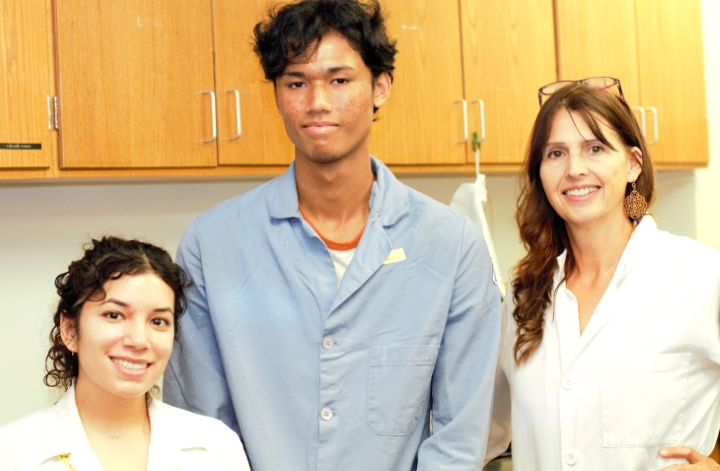SDSU, Tijuana Tecnológico partnership, born at Re:Border, expands to support non-profits on coastal water resilience
Researchers will work to standardize water quality analysis in labs on both sides of the border as part of the One Coast, One Community initiative

A cross-border water research alliance between San Diego State University and Instituto Tecnológico de Tijuana, which sprung out of SDSU’s Re:Border 2023 conference, has expanded to support two non-profits promoting coastal resiliency from Oceanside to Ensenada.
During Re:Border’s Think Tank last year, SDSU Environmental Engineering Professor Natalie Mladenov and Tijuana Tecnológico Researcher Mercedes Teresita Oropeza won a $5,000 micro-grant in the “Shark Tank” style pitch contest. Their pilot study centered on a low-cost reactor for nitrogen removal in decentralized wastewater treatment systems.
Now Mladenov and Oropeza are teaming up with San Diego Coastkeeper and Proyecto Fronterizo de Educación Ambiental on the One Coast, One Community initiative. The two non-governmental organizations (NGOs) recently received a $100,000 grant from the San Diego Foundation.
The grant supports community outreach and policy development by the NGOs to improve water quality affecting the health and safety of people along the binational coast. For Mladenov and Oropeza, their labs will be gearing up to provide water sampling and analysis to support future coastal water quality initiatives by the non-profits.
That means taking steps to coordinate their sampling and testing protocols, which will create standardized water quality methodologies across borders that could pave the way for additional funding going forward.
“We are starting this project by standardizing our methods so that, for future grants or initiatives, we are poised with the same technology and the same methodologies on both sides of the border,” said Mladenov.
Though the funding earmarked for the SDSU-Tijuana Tecnologico standardization is modest, it keeps the research collaboration going as the region confronts water pollution and scarcity issues along the border.
“They are incredibly well equipped scientifically in Mexico,” said Mladenov. “They have knowledge of their own watersheds and environment, and we have knowledge of our watersheds here, so we can bring those together.”
For Oropeza, the initial Re:Border collaboration, now nearing completion, produced “highly valuable results” on the topic of using microorganisms to generate electrical energy during wastewater decontamination.
“From this joint work, we had the opportunity to participate as academic collaborators with San Diego Coastkeeper and Proyecto Fronterizo de Educación Ambiental,” she said. “In my particular case, the subsidy represents an incentive to continue working on the issue of environmental remediation on the Tijuana-San Diego coast and binational border.”
Margarita Diaz, executive director of Proyecto Fronterizo, praised the San Diego Foundation for funding non-profits in both San Diego and Tijuana to support climate resilience.
“This is seed money, but it is great seed money because it is opening the door and saying we must work together,” said Diaz.
Meanwhile, SDSU’s research on decentralized water treatment systems continues. SDSU Engineering Professor Christy Dykstra, Public Health Professor Devrim Kaya, and Mladenov received funding from SDSU’s Sustainable Energy Center to pilot the system for treating nutrient-rich wastewater from agriculture in the Imperial Valley.
The Re:Border conference, now in its sixth year, brings together academics, policy makers, NGOs and other stakeholders to offer solutions to issues facing the California-Baja California region. Registration is now open. The conference takes place Oct. 15 at the SDSU’s main campus.

